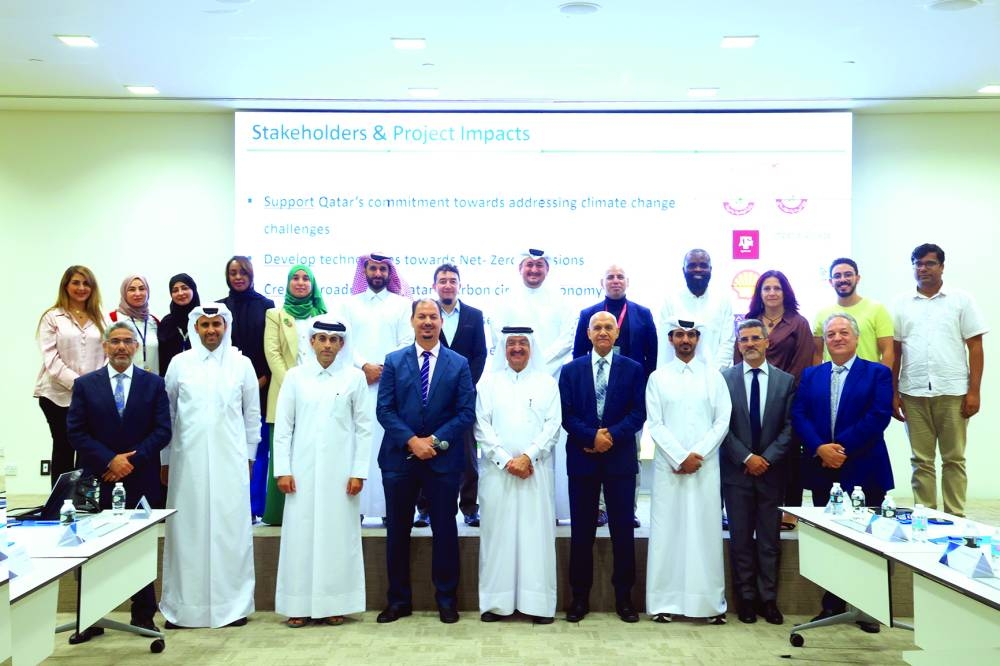The project has resulted in the filing of six patents so far, all of which directly relate to carbon management. Two prototypes have been successfully developed, and the initiation of one startup company (acDAC12) demonstrates tangible progress towards practical application. It has also involved 16 postgraduate and undergraduate students, providing them crucial experience on cutting-edge research in a critical field.
Funded by Qatar Research Development and Innovation Council (QRDI), the CCUS project aims to develop innovative Direct Air Capture (DAC) technology for CO2 capture and conversion, a cutting-edge approach that holds the potential to revolutionise carbon management practices on a global scale.
Involving a team of 37 researchers, including 10 students, the project collaboratively pushes the boundaries of carbon capture technology. This diverse team harnesses expertise from various fields to contribute to innovative solutions essential for sustainable carbon utilisation. The initiative brings together organisations including the Ministry of Environment and Climate Change (MoECC), Ministry of Municipality, the Abdullah Bin Hamad Al-Attiyah International Foundation for Energy and Sustainable Development, Qatar General Electricity and Water Corporation (Kahramaa), Qatar Shell, Agrico Qatar, Qatar University, and Texas A&M University at Qatar. Key experts from each organisation serve on the Cluster Steering Committee (CSC), which oversees the project.
The CCUS project is strategically aligned with several key objectives. It supports Qatar’s commitment to addressing climate change challenges, develops technologies towards Net-Zero emissions, creates a roadmap for Qatar’s carbon circular economy, builds capacity for local talented researchers and engineers, and advances local partnerships with MoECC/MM and Kahramaa to drive the national carbon management strategy.
Why carbon management?
Unlike conventional carbon capture techniques that draw CO2 directly from emissions sources, such as gas processing plants and steel plants, direct air capture (DAC) technologies extract CO2 from the atmosphere at any location. The CO2 can be permanently stored in deep geological formations or converted to value added products for a variety of applications. The CCUS process currently plays a pivotal role in helping countries achieve emissions reduction goals to combat climate change and supports the transition to a more sustainable low-carbon future.
By pioneering innovative technologies, this Qatar-led project endeavours to contribute significantly to global efforts to mitigate climate change while recognising the interconnectedness of environmental challenges. Innovation in CO2 capture and utilisation provides opportunities such as net-zero emissions and synthetic fuels production, which could drive down the costs and provide a market for DAC. A key aspect of this initiative is the development of carbon management systems.
The first Cluster Steering Committee (CSC)’s meeting held at QEERI, highlighted the initiative’s transformation from advanced research into a tangible pilot project. During the meeting, Dr Abdulkarem Amhamed, Senior Scientist and CCUS Program Director, QEERI, provided a comprehensive update on the project’s progress.
The committee members reviewed the project plan, celebrated achieved milestones, and examined efforts to de-risk technology development. The meeting underscored collective dedication to advancing environmental solutions and addressing climate change on a regional scale.
The success of the first CCUS Cluster Steering Committee meeting establishes a strong foundation for ongoing collaboration and future breakthroughs in carbon capture, utilisation, and storage.
Designed to be implementable by end-users in Qatar and beyond, the system aims to provide accessible and practical solutions for managing carbon emissions on a global scale.
By combining direct air capture and conversion technologies using HVAC systems, the project not only addresses climate change concerns but also supports public health and sustainability. Positioned as a comprehensive climate change solution, the project emphasises the interconnected pillars of sustainability, such as economic diversification and health improvements.
Additionally, the strategic focus on supporting food security and self-sufficiency through the conversion of captured CO2 into value-added products reflects a commitment to addressing Qatar’s national goals in a holistic and impactful manner.
The success of the CCUS project is made possible through the funding from the Qatar Research Development and Innovation Council (QRDI) and industrial partners. The project received invaluable support from the Research Office at HBKU and the Office of the Vice-President for Research (OVPR), highlighting the collaborative nature of this pioneering environmental initiative.
- Dr Abdulkarem Amhamed is Senior Scientist and CCUS Cluster Program Director at HBKU’s QEERI.
- (The thoughts and views expressed are the author’s own and do not necessarily reflect an official University stance).

